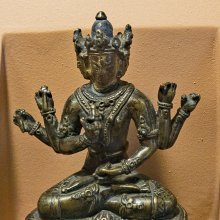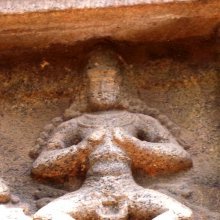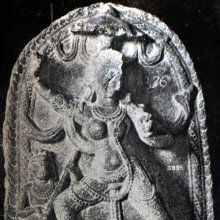Identification: 2 definitions
Introduction:
Identification means something in Hinduism, Sanskrit. If you want to know the exact meaning, history, etymology or English translation of this term then check out the descriptions on this page. Add your comment or reference to a book if you want to contribute to this summary article.
Images (photo gallery)
(+17 more images available)
In Hinduism
Yoga (school of philosophy)
Source: ORA: Amanaska (king of all yogas): A Critical Edition and Annotated Translation by Jason BirchIdentification (with a particular element) is denoted by the Sanskrit term Tanmayatā, according to verse 13.7cd-8 of the Mālinīvijayottaratantra.—Accordingly, “If one attains identification (tanmayatā) [with the water element, then], within six months steadiness is achieved. Within three years one attains gnostic vision of the water-realm. In the motionless division [of the Sakala contemplation] also, one is conjoined to the reality level of water [and becomes] in all respects similar to water”.

Yoga is originally considered a branch of Hindu philosophy (astika), but both ancient and modern Yoga combine the physical, mental and spiritual. Yoga teaches various physical techniques also known as āsanas (postures), used for various purposes (eg., meditation, contemplation, relaxation).
Shaiva philosophy
Source: archive.org: Chittanubodha Shastram By Bhaskara KanthaThe Identification of the Self with the body leads to suffering (and hence arises the necessity to uplift the soul from its bondage), according to the Cittānubodhaśāstra by Rājanaka Bhāskarakaṇṭha: an 18th century text dealing with aspects of Kashmir Śaivism such as the Pratyabhijñā (lit. “divine recognition”) philosophical branch.—The purport of the Cittānubodhaśāstra is to awaken the mind and to make it realize the truth of its own nature. [...] In the second chapter we find an exposition of all the kinds of subjects (pramātā), from dehapramātā to śūnyapramātā, which correspond to the different states such as the waking state which is established in the body, the dream state in the intellect (buddhi) and deep sleep in the vital principle (prāṇa). The identification of the Self with the body leads to suffering and hence arises the necessity to uplift the soul from its bondage.
-
See also (Relevant definitions)
Ends with: Self-identification.
Full-text (+1470): Brahmatva, Brahmasayujya, Brahmabhuya, Devasayujya, Sayujya, Aikyaropa, Brahmanirvana, Pahacana, Pratyabhijnana, Pahchan, Abhyavapata, Pratybhigyan, Ashwagandha, Shinakhta, Dalchini, Pilu, Brahmasakshatkara, Shanakhta, Abhijnana, Tadatmya.
Relevant text
Search found 238 books and stories containing Identification; (plurals include: Identifications). You can also click to the full overview containing English textual excerpts. Below are direct links for the most relevant articles:
Yoga-sutras (Ancient and Modern Interpretations) (by Makarand Gopal Newalkar)
Sūtra 1.4 [Cittavṛttis] < [Book I - Samādhi-pāda]
Sūtra 2.20 [Puruṣa] < [Book II - Sādhana-pāda]
Sūtra 1.3 < [Book I - Samādhi-pāda]
Chaitanya Bhagavata (by Bhumipati Dāsa)
Verse 2.3.134 < [Chapter 3 - The Lord Manifests His Varāha Form in the House of Murāri and Meets with Nityānanda]
Verse 2.13.64 < [Chapter 13 - The Deliverance of Jagāi and Mādhāi]
Verse 2.10.302 < [Chapter 10 - Conclusion of the Lord’s Mahā-prakāśa Pastimes]
Vivekachudamani (by Shankara)
Yoga-sutras (with Vyasa and Vachaspati Mishra) (by Rama Prasada)
Sūtra 1.4 < [Book 1 - Trance (Samādhi)]
Sūtra 4.22 < [Book 4 - Absolute Independence (Kaivalya)]
Sūtra 4.19 < [Book 4 - Absolute Independence (Kaivalya)]
Chenian Short Lectures in America (by Yogi C. M. Chen)
Chapter 2 - The Three Identifications < [Part One]
Chapter 3 - Deep Breathing < [Part One]
The Religion and Philosophy of Tevaram (Thevaram) (by M. A. Dorai Rangaswamy)
Chapter 42 - Namakkadigalakiya Adigal or Namakkatikalakiya Atikal (Hymn 33) < [Volume 3.4 - Pilgrim’s progress: with Paravai]
Chapter 1 - The ladder of love and Agamaic worship < [Volume 4.2.2 - Philosophy of Soul]
Chapter 63 - Ciparppatam (Hymn 79) < [Volume 3.5 - Pilgrim’s progress: to the North]
Related products










